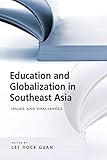Education and Globalization in Southeast Asia [electronic resource] : Issues and Challenges.
Language: English Publication details: [S.l.] : ISEAS - Yusof Ishak Institute, 2017.Edition: 1Description: 213 pISBN:- 9814762903
- 9789814762908
| Item type | Current library | Home library | Collection | Call number | Materials specified | Copy number | Status | Date due | Barcode | |
|---|---|---|---|---|---|---|---|---|---|---|
| AM | PERPUSTAKAAN TUN SERI LANANG | PERPUSTAKAAN TUN SERI LANANG KOLEKSI AM-P. TUN SERI LANANG (ARAS 5) | - | ebook (Browse shelf(Opens below)) | 1 | Available |
Includes bibliographical references and index.
Education and Globalization in Southeast Asia: Issues and Challenges -- Contents -- Acknowledgements -- Contributors -- Introduction -- 1. English in Singapore and Malaysia: Common Roots, Different Fruits -- 2. Globalization, Educational Language Policy and Nation-Building in Malaysia -- 3. Second-Order Change Without First-Order Change: A Case of Thai Internationalization of Higher Education -- 4. Higher Education in Malaysia: Access, Equity and Quality -- 5. Indonesian Higher Education: Gaps in Access and School Choice -- 6. Increasing Access to and Retention in Primary Education in Malaysia -- 7. Primary and Secondary Education in Myanmar: Challenges Facing Current Reforms -- Index.
Prior to the era of globalization, education in Southeast Asia was viewed in the context of the national state and it was deployed in the service of state and nation-building and national economic development. States monopolized education, and public-funded centralized education systems were established to teach literacy, transmit national cultures and promote social cohesion, and to produce literate workers. Globalization forces, however, dramatically impacted in varying ways and degrees the national education systems across the region. As states begun to see their citizens as resources to enhance the countries' competitiveness in the global market, it, among other things, led to the increasing demand for highly skilled and qualified human capital. The accompanying neoliberal ideology led to varying degrees of decentralization, privatization and internationalization of education, especially of higher education, in Southeast Asia.
There are no comments on this title.

